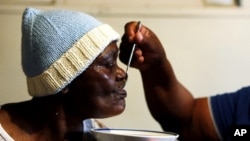The United Nations says the world is finally ready to achieve the goal of zero new HIV infections, zero discrimination, and zero AIDS-related deaths. There are various challenges and responses to that vision in Zimbabwe and South Africa.
What's changed
In the past few years, South Africa has come to grips with the HIV/AIDS pandemic. The government is now reporting that new infections in pregnant women have stabilized.
Even so, the country remains plagued by HIV, the virus that causes AIDS.
The South African government, non-governmental organizations and the private sector currently treat about one million people infected with HIV or AIDS. Official statistics say another 5 million are infected among the country’s 50 million people.
Big business in the country is now making significant contributions in the fight against the disease. Some private sector employers say testing and treating those infected, and not discriminating against them makes financial sense.
Anglo America, one of South Africa’s largest and oldest mining companies, employs 70,000 fulltime staff. The company says its 11-year effort to provide free care and treatment to 12,000 HIV positive employees has paid off.
“To build trust with our employees, to get rid of discrimination and to save lives,” said Chief medical officer Brian Brink, explaining why it is morally correct to provide full care and treatment for infected workers.
He said that Anglo American employees on anti-retroviral drugs were able to lead near-normal lives and knew they would not suffer discrimination in the workplace.
Slow progress
In Zimbabwe the picture is different. HIV/AIDS was first diagnosed in the country 25 years ago and the government of President Robert Mugabe initially ignored it. Instead, donors and independent journalists, and a few well-known personalities who were infected, spread the word about the disease and how to avoid infection.
Eventually the government began to take the disease seriously. In 2007, the U.S. Agency for International Development concluded a countrywide testing project and found that Zimbabweans, more so than others in the high-infection countries, had begun to change their behavior, resulting in the rate of new infections to drop significantly.
Before Zimbabwe's inclusive government came to power in 2009, Mugabe's financial policies created hyperinflation, ripping the economy apart and causing AIDS-related deaths to spiral as money to buy anti-retrovirals [ARVs] became scarce.
But these days, new infections have been cut in half since the early days of the pandemic. Most urban Zimbabweans are well informed about the disease and it is more openly discussed.
Jennifer Masaisai took her children to a Harare hospital this week for their annual health checks.
“Overall at government level, I would applaud them. They are doing well, like the approach they have used toward the mother-to-child transmission. There has been massive education and there’s a lot of campaigning that has been done to try to minimize at all levels any new infections among newly-born babies,” said Masaisai.
Challenges remain
Soloman Banda was less complimentary about the government's management of HIV/AIDS.
“Most people who have already started ARVs treatment are actually complaining that they are not getting treatment on time. Sometimes they are defaulting and that is very dangerous,” said Banda.
Orlando Manuwere, communications officer for the National AIDS Council, is optimistic that in spite of declining international donor support, Zimbabwe's government may be able to fund more ARVs via the AIDS tax to which all taxpayers contribute.
“It’s good news that the economy is projected to grow by around 9.4 percent, so obviously that is going to have a ripple effect on what goes toward health, what goes towards the AIDS levy,” said Manuwere.
Medical scientists say 30 years after the world became aware of this new virus, and despite significant advances in treatment and prevention, the goal of 2011 World AIDS day is still a long way off, particularly in southern Africa.
Photo Gallery: World AIDS Day

















